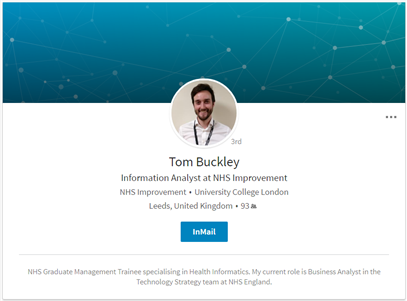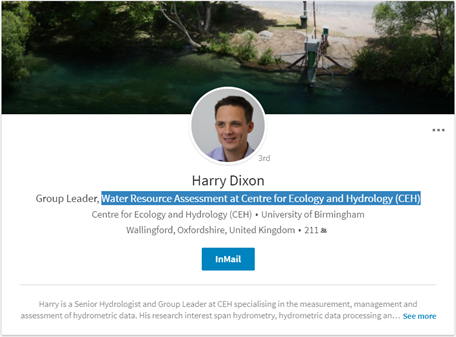What is informatics?
Informatics describes the practice of information processing and the engineering of information systems; as an academic field it is an applied form of information science. The field considers the interaction between humans and information alongside the construction of interfaces, organisations, technologies and systems. As such, the field of informatics has great breadth and encompasses many subspecialties, including disciplines of computer science, information systems, information technology and statistics.
Since the advent of computers, individuals and organisations increasingly process information digitally. This has led to the study of informatics with computational, mathematical, biological, cognitive and social aspects, including study of the social impact of information technologies.
Throughout your degree you may use systems that develop and improve methods for acquiring, storing, organising and analysing data sets, to provide specific results, such as GIS systems (e.g. ArcGIS) and statistics packages (e.g. SPSS.) Informatics careers take these approaches to a whole new level, utilising ‘big data’ sets to inform strategic decision-making and the delivery of tailored services.
Informatics and data are used by many organisations to provide targeted information and tailored experiences, with several items appearing in the news concerning the use of such data. Indeed, this has influenced the development of new guidance such as General Data Protection Regulations (GDPR), to protect members of the public regarding the use of their information.
What roles are available?
Although careers featuring the word “Informatics” may be limited (e.g. NHS Clinical Bioinformatics), it may be helpful to think of opportunities more broadly, including titles such as Data Analyst and Business Analyst.
Information about roles can be found at NHS health careers, and some other examples of informatics roles include:
- Environmental roles - A wealth of environmental data is gathered continuously and requires people to make sense of it and use it effectively. The Met Office has its own Informatics Lab, combining scientists, technologists, and designers to make environmental science and data useful, building prototypes to test new technologies, techniques and designs.
- IT roles include analyst programmer; business analyst; computer games developer; e-commerce developer; information architect; interaction developer; IT manager; management consultant; mobile app engineer; online marketing analyst; project manager; quality assurance lead; software engineer; user experience architect; video production manager; web application developer. In addition, roles such as Information security specialist relate to the use of data.
- Logic and Mathematical Informaticist - Test new operating systems, encoding and decoding of private information, as well as researching data implications on artificial intelligence and bioinformatics.
- Social Informaticist - Studies the interdisciplinary effects of information technology, ranging from its design and usage to its many effects. They use the critical thinking methods of psychologists, historians, and anthropologists in the exploration of cultural and social contexts of IT.
- Security Informaticist - They are responsible for designing, implementing, and managing the security of programmes and take economics, legislation, and social behavior into consideration when it comes to making programmes for privacy and security.
- Music Informaticist - Explores the new applications of music as data in different forms: audio, performance, graphical, or symbolic. They deal with music search, synthesis of music, music source operation, music composition for games, optical music recognition, audio signal-to-score, score following, and music analysis.
- Complex Systems Analyst - An informaticist who specialises in discovering and understanding the different parts of the system and how they interact with each other. This interdisciplinary field combines the studies of physics, maths, biology, computer science and social sciences.
What do I need to have?
Different informatics careers require different levels of knowledge. For example, a career in a bioinformatics role such as health bioinformatics will require a good grounding in information analysis and computing, as well as an understanding of clinical, biomedical or physical sciences.
However, if your first degree wasn’t in the subject of the role, that doesn’t mean that you can’t aspire to it. For example, the NHS offers a range of graduate management trainee specialist opportunities, including Health Informatics.

Tom Buckley (right) completed the NHS Graduate Management Trainee as a Business Analyst in May 2017, although his original undergraduate degree was a BSc (Hons) in Physical Geography. Since graduating, Tom worked in a number of NHS roles, beginning with Administrative Officer and building-up experience over time, whilst also completing postgraduate qualifications in Healthcare Leadership and Health Informatics.

Harry Dixon is a Group Leader in the Water Resource Assessment at the Centre for Ecology and Hydrology (CEH), who graduated from the University of Birmingham both with a BSc (Hons) and a PhD in Geography. Upon completing his PhD, his first job was an Informatics Liaison Officer with CEH, in which he worked alongside scientists to improve daily working practices in informatics provision and environmental data management. Harry then went on to Head the UK's National River Flow Archive, a data centre providing information in support of areas such as flood risk management and water resources planning.
Whereas Tom needed to gain experience before being in a position to apply for his role, Harry’s academic experience provided him with sufficient knowledge to meet the employer’s requirements.
If you’re considering further study, a range of related Masters courses are available. As the specific details and availability of particular courses is often subject to change at short notice, you may find it most helpful to look for current courses at Find a masters and Prospects postgraduate courses.
Work experience and relevant skills?
An increasing number of organisations offer work experience and internships involving statistics and data analysis.
FDM Group is a professional services provider with a focus on IT and is also the UK’s leading IT graduate employer. FDM’s business model is both unique and robust, bringing people and technology together. (Although it focuses on IT, only approximately 10% of its graduate workforce have an IT background; successful applicants span a wide range of disciplines including Biosciences, Geography and Geology and are trained to become IT consultants once recruited). In addition to recruiting over 1,000 new graduates annually, FDM offers a number of internships and placements, including a year-long data analysis role, created to enable the company to identify and act upon significant trends in their graduate recruitment.
Successful internship applications require applicants to demonstrate competency using standard data packages such as Excel. It isn’t satisfactory to tell the employer that you can use the programme – what can you do with it? Consider what evidence you can provide to demonstrate your abilities. For example, how might you have used it during your studies to assist with project data? If you lack some crucial knowledge, remember that a range of digital and technology skills courses are available through the University. If you are uncertain how to articulate your experience, Careers Network’s CVs, applications, interviews, assessment centres resources might help you.
Useful contacts and resources